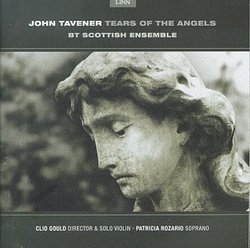| All Artists: Clio Gould, Matthew Rooke, BT Scottish Ensemble Title: Tavener: Tears Of The Angels, etc. / Gould, BT Scottish Ensemble, et al Members Wishing: 1 Total Copies: 0 Label: Linn Records Release Date: 3/23/1999 Genres: Pop, Classical Styles: Vocal Pop, Opera & Classical Vocal, Chamber Music, Forms & Genres, Concertos, Instruments, Strings Number of Discs: 1 SwapaCD Credits: 1 UPC: 723723507921 |
Search - Clio Gould, Matthew Rooke, BT Scottish Ensemble :: Tavener: Tears Of The Angels, etc. / Gould, BT Scottish Ensemble, et al
 | Clio Gould, Matthew Rooke, BT Scottish Ensemble Tavener: Tears Of The Angels, etc. / Gould, BT Scottish Ensemble, et al Genres: Pop, Classical
|
Larger Image |
CD Details |
CD ReviewsInteresting musical synthesis Ephraim Khalife | Southeastern USA | 03/19/2001 (3 out of 5 stars) "Most folks familiar with Tavener's music, won't be familiar at all with the various Eastern traditions he draws from. The text for "Depart in Peace" comes from the "Song of Simeon." St. Simeon is an elderly first century saint that held Jesus in his arms and prayed to God, "Now lettest Thy servant depart in peace" since he had seen God incarnate. The piece draws on Orthodox Liturgical music and perhaps most interstingly (for a piece with a Christian theme) it draws heavily on various music forms from India (although there are permanent Christian settlements in India dating from the 1st century.) It uses the tamboura (tanpura) that is the drone instrument used in North Indian classical music (hindustani music), it also uses a vocal technique that is quite similar to qawwali, a style of Muslim Indian (and typically thought of as Pakistani) form of Muslim devotional music, which is quite estatic in nature and usually carries sufi themes. Similar to qawwali, which only repeats a single line or two throughout a piece, Patricia Rozario (a soprano born in Bombay) chants "Alleluia" over and over again. Rozario is surely familiar with qawwali and is probably more qualified to sing it that any other opera/western music singer (which is what she performs regularly) Despite this interesting synthesis, the piece only somewhat works. Tavener certainly understands these other musical forms well, and has done a pretty good job merging them, but the piece is a bit long. It satisfies niether the qawwali aspect nor the western aspect, and you kind of feel like you are "left hanging" in both respects. Qawwali explodes with ecstatic intensity, and near Eastern Orthodox music has a more subdued even-tempered, but equal mystical intensity, and in some ways, the sharp contrast of the two next to one another really cancel each other out. All that being said, it is still pretty interesting, and can be quite moving sometimes, but it isn't a piece that consistently satisfies, you kind of have to be in the mood for it."My Gaze Is Ever Upon You" and "Tears of the Angels" share the same problem, they are a bit too long, and a tad repetitive...especially "My Gaze Is Ever Upon You," which is for solo violin and tape.If you want to check Tavener's music out for the first time buy "The Protecting Veil," or "Akathist of Thanksgiving," you'll be MUCH happier." Almost worth 5 stars G. Faville | Wisconsin | 10/25/2005 (4 out of 5 stars) "It would be useless to repeat what the excellent reviewers before me have posted about what is contained in this disc--there are some excellent explanations and histories to read below this, so I will simply build on them and defend what some say are weaknesses. No music is appropriate for all times--so it is advisable to put this on when you are feeling meditative or spiritual, or even in a sombre or nostalgic mood. The first few times I played this disc, four years ago, the last tune--Tears of the Angels--was grating with all of the high violin trills (and I'm a violinist), putting it on recently the piece moved me to the point of tearing up myself. The second piece, My Gaze is Ever Upon You, is hardly repetitive, just divided into 16 "gazes" each with their own character. It was good enough to inspire me to buy the music and try it out myself with my own CD recorder (fun and challenging). The first piece, "....Depart in Peace" is perhaps the most blatantly repetitive, but it is subtly more devastating in its beauty. With each reiteration of the patterns, they are extended in length and breadth of sound--deeper bass, more involved texture and harmony, more intense dynamic range. If you are not paying attention and only listening casually, you will only hear repetition. I am still listening to this disc regularly and still being emotionally moved after four years. Highly recommended." First Tavener Experience: Enjoyable Edwin J. Rogers | Lakeland, Florida United States | 07/12/2001 (4 out of 5 stars) "I first heard "Depart in Peace" in my car after having tuned in about 1/4 of the way through. I listened through to the end so that I could hear the title of the work and names of composer and artists. I knew I must purchase the CD. While I agree with some of the more critical comments of the other reviewers, I still think that these works can provide hours of enjoyable listening to those who appreciate introspective, contemplative music. The three pieces accomplish the composer's goals as stated in the liner notes, although "Depart in Peace" remains my favorite. The warm voice of Patricia Rozario and the sometimes plaintive, yet sparkling violin of Clio Gould are a perfect fit for the piece. In short, my first Tavener experience was enjoyable, and the CD is certainly worthy of a listen."
|

 Track Listings (3) - Disc #1
Track Listings (3) - Disc #1